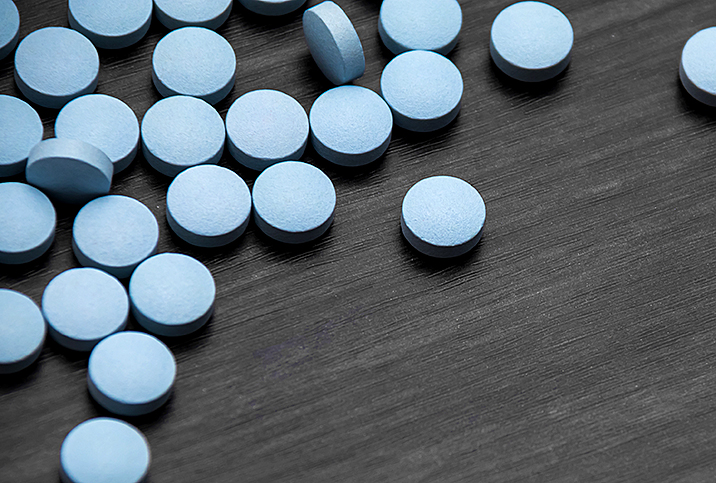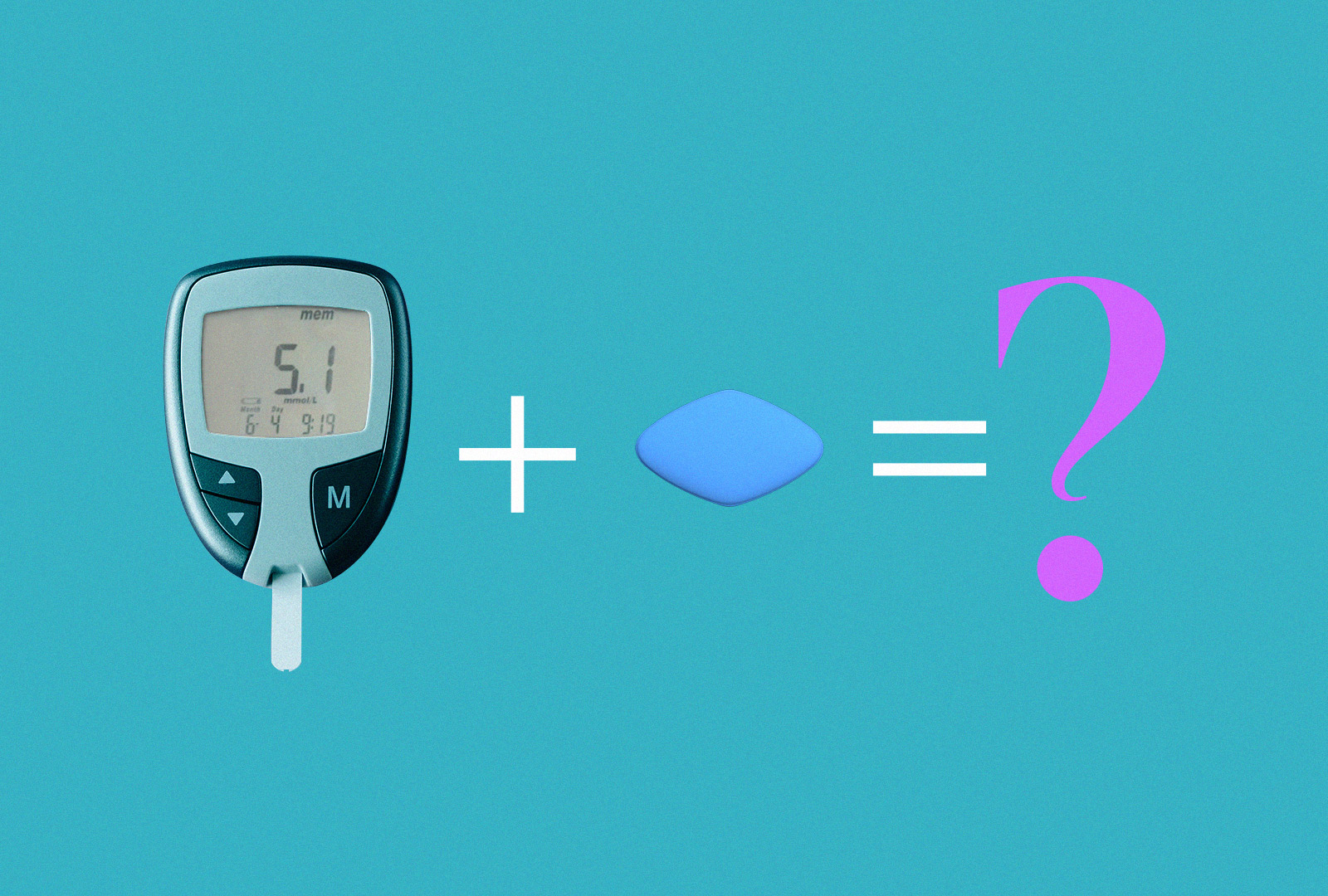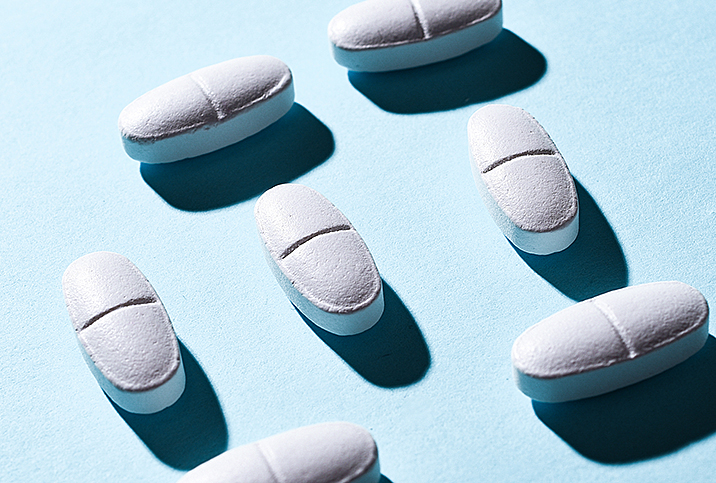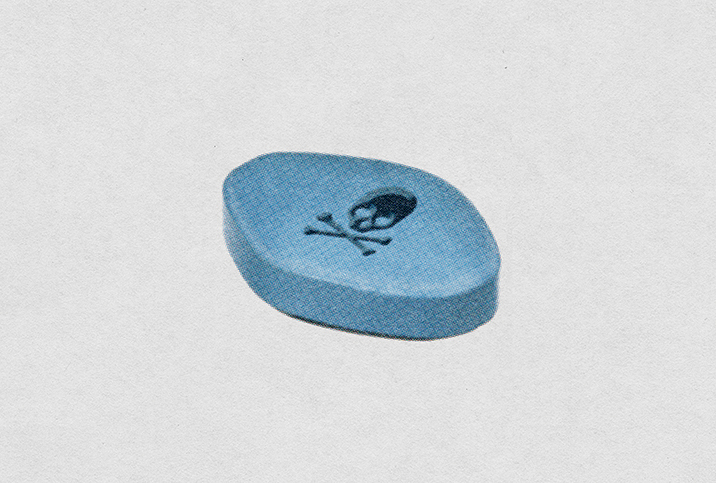ED Medications Work for Many—But Not All—Men With Diabetes
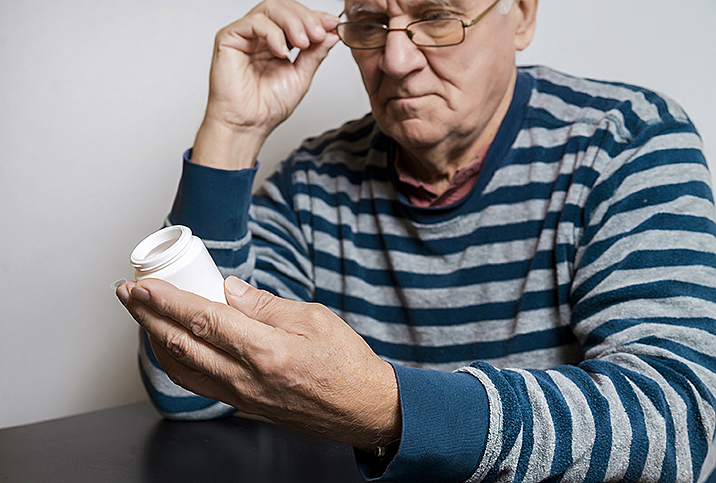
Men with diabetes are at risk of a host of long-term health issues if they don't keep their blood sugar levels in check. In addition to experiencing nerve damage, heart problems and kidney damage, diabetic men can encounter trouble in the bedroom, too.
Diabetes is among the top risk factors for erectile dysfunction (ED), or the inability to keep and maintain an erection rigid enough for sex. In fact, men with diabetes are three times more likely to experience ED than men without diabetes, according to a 2014 study. For this reason, many diabetes patients turn to ED prescription drugs known as phosphodiesterase type 5 (PDE5) inhibitors, which cause the blood vessels to relax and increase blood flow to the penis.
That's great, right? For most guys, yes. But is it safe for men on diabetes medications to take these ED drugs? In other words, are there any contraindications—factors that make a particular medical treatment inadvisable because it might cause harm to the patient—between popular diabetes drugs and PDE5 inhibitors such as sildenafil (Viagra) and tadalafil (Cialis)?
Not really, according to Martin Kathrins, M.D., an assistant professor of surgery at Harvard Medical School and a urologist at Brigham and Women's Hospital in Boston. However, one major contraindication for ED medications that might be applicable to a man with diabetes is nitrate medications such as nitroglycerin and isosorbide mononitrate. Men on nitrates—whether they have diabetes or not—cannot take ED drugs because the interaction can cause a severe drop in blood pressure, potentially leading to a heart attack or stroke.
Men with diabetes are also twice as likely to have heart disease, according to the Centers for Disease Control and Prevention, so if a man is taking heart medications, at that point ED drugs might not be appropriate.
Men on nitrates—whether they have diabetes or not—cannot take ED drugs because the interaction can cause a severe drop in blood pressure, potentially leading to a heart attack or stroke.
"There are a number of cardiac conditions where we would not treat them for erectile dysfunction without clearance from a cardiologist," Kathrins said.
For example, men with congestive heart failure or arrhythmia (irregular heartbeat) may undergo an exercise stress test and see a cardiologist before they are treated for ED, because sexual intercourse is a cardiac stressor.
Men with uncontrolled diabetes or a history of severe microvascular disease are less likely to respond to ED medications, Kathrins said. Diabetic men on PDE5 inhibitors are also at a slightly higher risk for optic neuritis, a rare condition involving inflammation of the eye's optic nerve and vision loss. Kathrins informs all his patients, not just those with diabetes, about the very low risk of vision loss when taking ED drugs.
"If you have an informed-consent conversation with the patient, the patient understands what the risks of the medication are," he said, adding that the risks of a PDE5 inhibitor are outweighed by the potential benefit. Kathrins said most of his diabetic patients prefer an oral medication rather than invasive ED treatment options such as surgery.
Side effects of ED drugs
The general side effects of ED medications—headaches, stuffy nose, dizziness, flushing, heartburn, lower extremity cramping—are equally common among all men and not more prevalent in men with diabetes, according to Seth Cohen, M.D., an assistant professor of urology and the director of sexual medicine at NYU Langone Health in New York City.
Neel Parekh, M.D., a clinical assistant professor of urology at the Cleveland Clinic, said he hasn't seen more ED drug side effects in men with diabetes compared to those without either. However, he has noticed a difference in relation to food intake.
While medications such as Viagra are fast-acting, they can be affected by food and therefore need to be taken on an empty stomach.
Some people with diabetes experience a slower emptying of their stomach because their digestive system is affected, Parekh explained. He makes sure diabetic patients know to take the medication at least three hours after a meal.
Parekh is more likely to prescribe Cialis over Viagra because it's impacted less by food. Cialis is slower-acting than Viagra, but it has a longer half-life—the duration in which the concentration of the drug gets to half its original value—so it lasts longer.
Improve erections with diabetes control
Men with uncontrolled diabetes, meaning their blood sugar levels are consistently high, need to lower their hemoglobin A1C level, Cohen said. A test for hemoglobin A1C, or HbA1C, measures a patient's average blood sugar levels over the previous three months. High blood sugar essentially robs men of their sexual performance, he said.
"With high levels of sugar running around their bodies, they're in a very pro-inflammatory state," Cohen explained. "High inflammation is not good for sexual function, and, of course, that may be one of the reasons why they're seeing me in the office: their erections aren't working."
Men who get their glucose level under control with medical therapies, diet and exercise certainly see improvements in their sexual function, Cohen said. However, the improvement doesn't happen overnight.
"These things can be months in the making," Cohen said. "It's getting them back on the right track."
Unfortunately, some men may even need years to get their HbA1C levels under control. Parekh asks his diabetic patients if they have numbness or tingling in their fingers or toes. If they do, they likely have neuropathy, a type of nerve damage caused by high blood sugar.
"If those nerves are already affected, it's very likely that the nerves in the penis, which are even smaller than the nerves in the hands or the toes, are also likely affected," Parekh said. "Sometimes nerve damage is irreversible."
To prevent nerve damage from worsening, Parekh encourages these patients to get their blood sugar under control, and counsels them about ED medications and other treatment options approved by the Food and Drug Administration.
A tiered approach to treating ED
Kathrins said he would have "tempered optimism" for a man with high A1C who is put on a PDE5 inhibitor.
"I think I would try to manage that man's expectations as far as what kinds of results he's going to see, but we generally have a tiered approach for the treatment of erectile dysfunction," he said.
In addition to oral medications, Kathrins encourages diabetic men to get regular aerobic exercise and eat a healthy diet. He puts both diabetic and nondiabetic patients with ED on a tiered pathway. This means he sees how they fare on the ED drugs, a first-line therapy, before moving on to secondary therapies, such as wearable devices—vacuum devices and Eddie by GiddyⓇ are two examples—suppositories and injections.
"Walk a mile in his shoes; he'll tell you whether the result is good or sufficient," Kathrins said. "You really want to maximize all medical therapies while emphasizing control of blood sugar."












